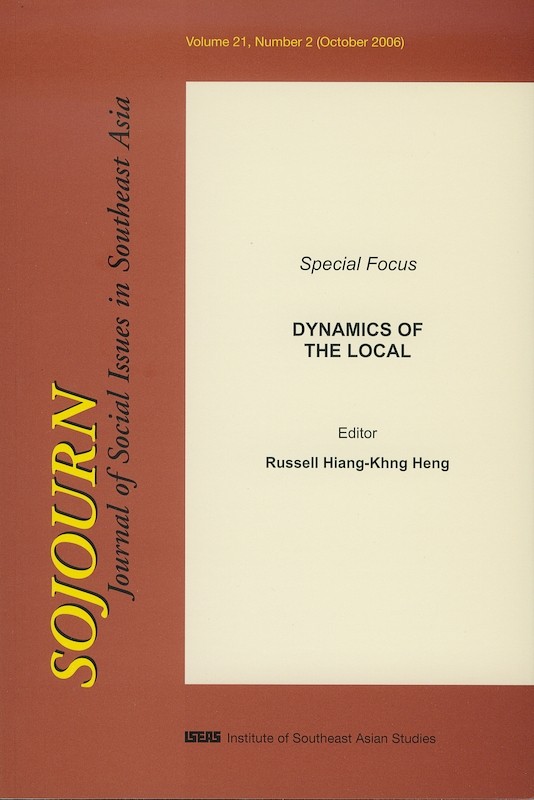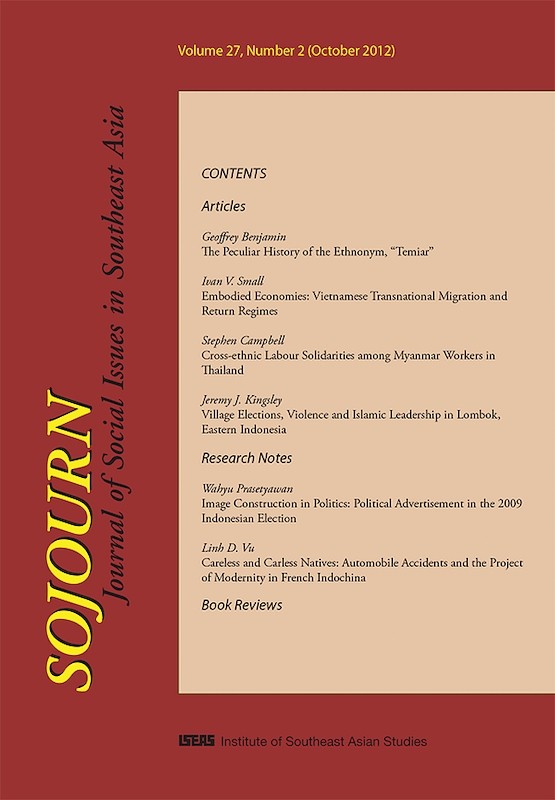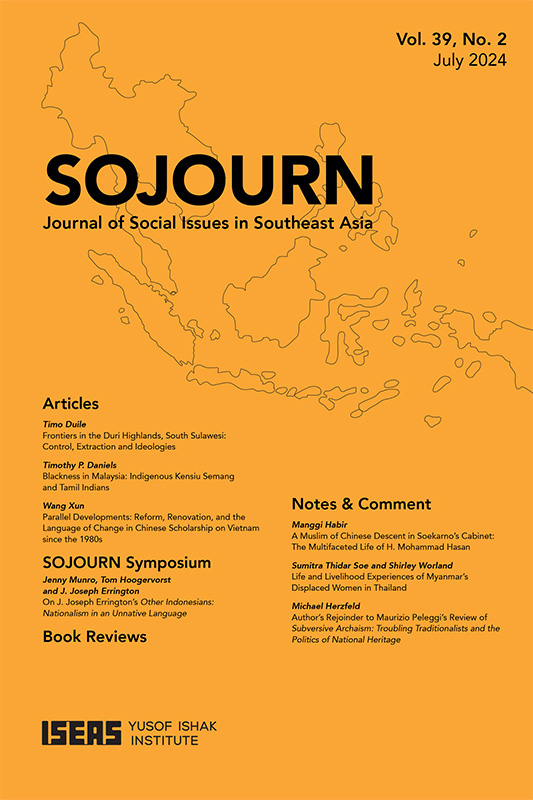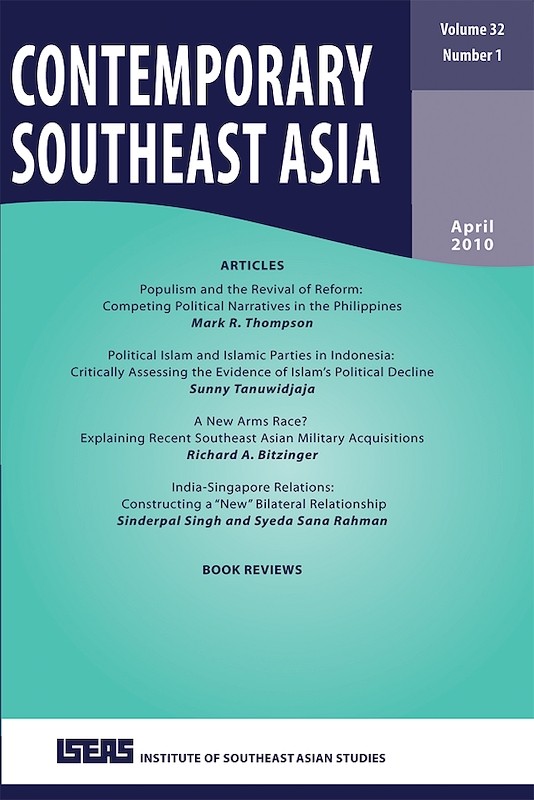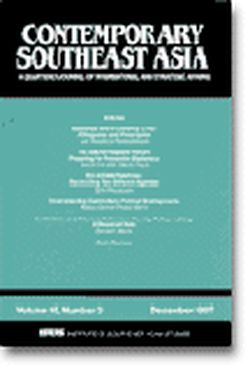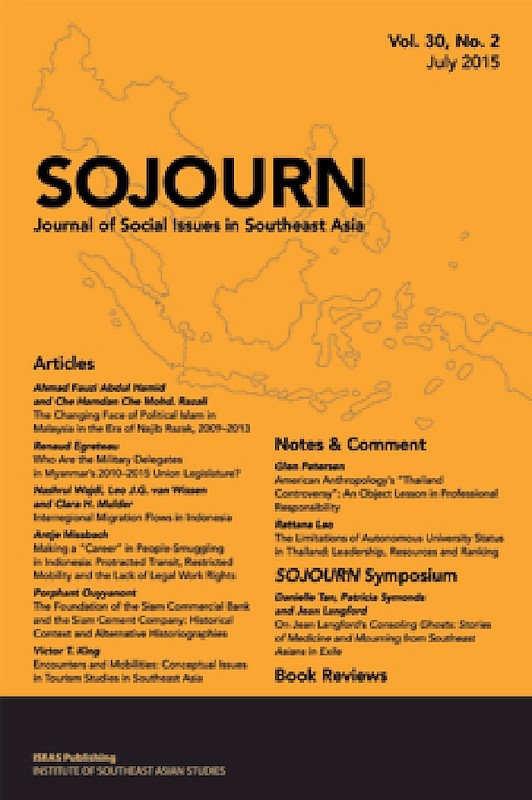SOJOURN: Journal of Social Issues in Southeast Asia Vol. 7/2 (August 1992)
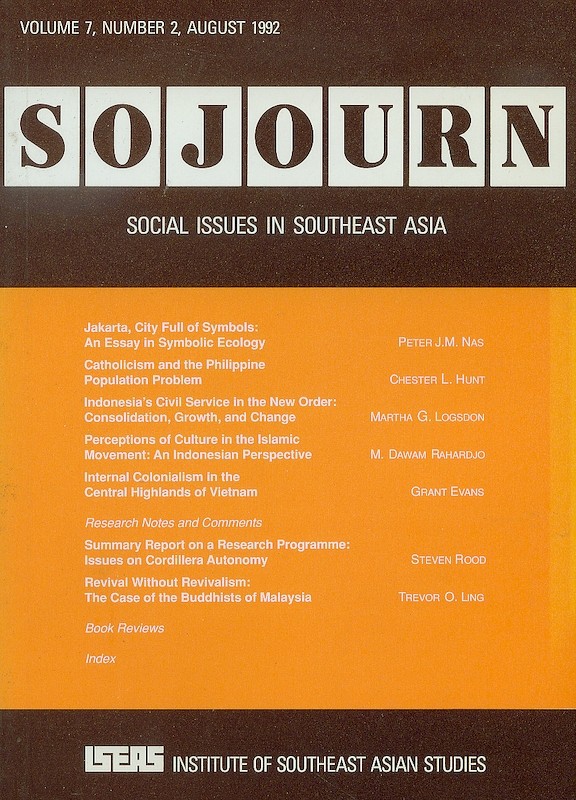
Date of publication:
August 1992
Publisher:
Institute of Southeast Asian Studies
Number of pages:
140
Code:
SJ7/2
Contents
-
Preliminary pages
- ARTICLES
-
Jakarta, City Full of Symbols: An Essay in Symbolic Ecology, by Peter J. Dean, author see abstractThis article focuses on the signs and symbols of contemporary Jakarta, including statues, street names, images of the city in poems, paintings, stamps, graffiti, word games, as well as in the modern myths, which are being spread by television Alongside the symbolism of Jakarta, it also takes that of Leiden into consideration. While it attempts to flesh out some insights on Jakarta and Leiden from their contrasts, it does not aim at a systematic comparison. The discussion on Jakarta and Leiden is based on informal talks and conversations, the location and observation of statues, and the collection of data, such as poems, songs, stamps, photographs of paintings and sculptures, lists of street names, observation of television programmes, and so on. Formal written interviews with a group of students was also conducted in Jakarta, and research in the municipal archives was conducted in Leiden.
-
Catholicism and the Philippine Population Problem, by Chester L Hunt, author see abstractThe Philippines has two characteristics which differentiate it from other countries in Southeast Asia. It is the only predominantly Christian country in the region and it has one of the highest rates of population growth. Non-Catholic Christians make up only about 9 per cent of the population compared with around 82 per cent for Roman Catholics. Given the Catholic Church objections to both contraception and abortion, it is not illogical to hypothesize a relation between the religious composition of the population and its rate of population growth.
-
Indonesia's Civil Service in the New Order: Consolidation, Growth, and Change, by Martha Logsdon, author see abstractThe performance and character of governmental bureaucracies affect not only policy making and implementation but, in the long term, regime support as well. Political leaders therefore try to control and use them for various purposes. The Indonesian civil bureaucracy underwent numerous changes in the 1974-84 period, which reflect both regime policies and broader societal and political changes. This paper utilizes data from the 1974 re-registration of civil servants and subsequent updates. It analyses the rapid growth of the bureaucracy, the changing distribution across Ministries, the implications of the growth of the middle ranks, and changing patterns of performance.
-
Perceptions of Culture in the Islamic Movement: An Indonesian Perspective, by M Dawam Rahardjo, author see abstractUnder the banner of "Back to the Quran and Sunnah", which symbolizes an opening of the door to reason (ijtihad) and scientific enquiry (roh intigat), there has been an ongoing shift in some fundamental notions of Islam. This shift has contributed to the redirection of the Islamic movement in Indonesia since the 1930s. This essay attempts to survey recent developments in the endeavour to "re-interpret" Islamic notions within the Islamic movement in Indonesia-an endeavour which centres around the issue of the relation between religion and culture, and goes beyond the issues posed by the East-West debate. The development of Muslim culture in the future, according to the author, will be shaped by two trends. The constant yearning for reformed Islamic values, and the critical awareness of development in the modern world, which is perceived to be going through a process of structural deformation.
-
Internal Colonialism in the Central Highlands of Vietnam, by Grant Evans, author see abstractThis paper provides a critique of Vietnamese communist policy in the Central Highlands since 1975. It first examines the impact of internal migration on the highlands, then it looks at how Vietnamese anthropologists have understood these developments and extracts from their studies references to the social and cultural changes induced by the policies of the new regime and the practices of some of its cadres. Finally, it briefly surveys what is known of the indigenous peoples resistance to Vietnamese internal colonialism.
- RESEARCH NOTES AND COMMENTS
-
Summary Report on a Research Programme: Issues on Cordillera Autonomy, by Steven Rood, author see abstractOne of the most novel aspects of the 1987 Philippine Constitution is the provision for Autonomous Regions in the Cordillera and Muslim Mindanao, for areas "sharing common and distinctive historical and cultural heritage, economic and social structures, and other relevant characteristics". Support for establishing an Autonomous Region in the Cordillera, however, is not unanimous. This paper reports some findings on research conducted by a team headed by the author, and centred at the Cordillera Studies Center, on the issues involved in setting up an Autonomous Region in the Cordillera. In particular, it discusses some of the issues raised by the extremely varied nature of the cultures of the Cordillera peoples, and the nature of local territorial boundaries and resource control, as well as the difficulties and potential presented by indigenous institutions for the institution of autonomy in the Cordillera.
-
Revival Without Revivalism: The Case of the Buddhists of Malaysia, by Trevor O Ling, author see abstractThe concern of this paper is with a recent, clear example of religious revival namely, the notable recovery and revival of the Buddhist tradition which has occurred in Malaysia in recent times. This has been very largely, though not exclusively, experienced among people of Chinese origin and descent, and is a case of religious revival in the course of which it has not been seen necessary or desirable to resort to "revivalism". The roots of this attitude probably lie in the nature and in the central emphasis of the Buddhist tradition itself.
- BOOK REVIEWS
-
BOOK REVIEW: Rural Credit between Subsidy and Market: Adjustment of the Village Units of Bank Rakyat Indonesia in Sociological Perspective. By Leonardus T Schmit., by Hans-Dieter Evers, author
-
BOOK REVIEW: The Wheel of Fortune: The History of a Poor Community in Jakarta by Lea Jellinek., by Patrick Guiness, author
-
BOOK REVIEW: Managing Turbulent Hearts: A Balinese Formula for Living. By Unni Wikan., by Richard Howard, author
-
BOOK REVIEW: Economic Dimensions of Ethnic Conflict. Edited by S W R Samarasinghe and Reed Coughlan., by Lian Kwen Fee, author
-
Index to SOJOURN: Social Issues in Southeast Asia Volume 7 (1992)

